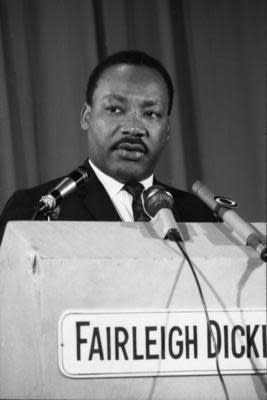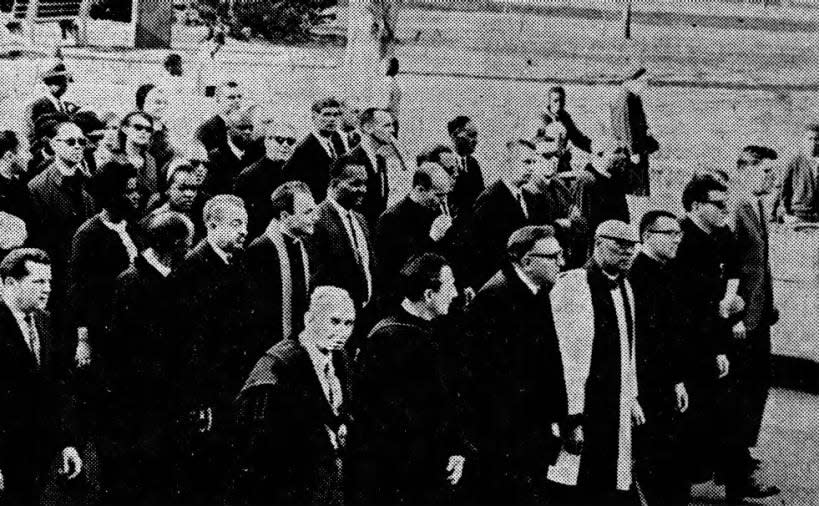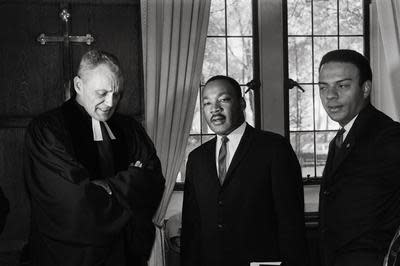Remember when ... Central Jersey reacts to Martin Luther King Jr.'s assassination
- Oops!Something went wrong.Please try again later.
Civil rights movement leader, advocate of nonviolence and Nobel Prize winner Dr. Martin Luther King Jr. was assassinated while standing on the balcony of his motel in Memphis on Thursday, April 4, 1968.
King's murder had a much further reach than Memphis ― it affected the entire nation.
And Central Jersey was certainly no exception.
Between 50 and 75 Black students at Rutgers University and Douglass College in New Brunswick marched in silent protest on Friday, April 5, 1968, angered over King's assassination. Marching between the two campuses, the students distributed leaflets protesting what they termed "the white apathy regarding the inherent racism" in the U.S.'s social, economic, educational and political institutions.

President Lyndon B. Johnson proclaimed Sunday, April 7, 1968, which was also Palm Sunday, a day of mourning for King. Several services in honor of King were held in churches and public halls in New Brunswick and surrounding municipalities. A capacity crowd also filled the Crescent Avenue Presbyterian Church in Plainfield that day.
More: Remember when … President Reagan and others were shot by John W. Hinckley Jr
The largest civil rights rally in the history of New Brunswick was held on Monday, April 8, 1968, as about 1,100 people chanted “racism must go” and called for the ouster of Milton Zatinsky, then the executive director of Middlesex County Economic Opportunities Corp.
King's assassination sparked nationwide riots, some taking place close to home.

The Associated Press reported violence erupted in Trenton on Tuesday, April 9, 1968, and there were a number of fires in Newark.
The assassin
Charged with King's murder, the Associated Press reported, was James Earl Ray. After fleeing, Ray was eventually arrested on Saturday, June 8, 1968, in London.
Ray pleaded guilty to King's death on Monday, March 10, 1969.
Avoiding a possible death sentence, he was sentenced to 99 years in prison in the Tennessee State Penitentiary, A few days later, Ray recanted, according to the Associated Press.
More: Remember when ... Clarence Thomas confirmed to US Supreme Court amid allegations
Ray died on Thursday, April 23, 1998, of liver failure caused by a chronic hepatitis infection, according to the Associated Press.
Local reaction
King's death struck an emotional chord with Central Jerseyans.
"A prince has fallen. A great prince has fallen," said the Rev. Charles H. Shelton, pastor of Ebenezer Baptist Church in New Brunswick at the time.
George F. Hetfield, then the mayor of Plainfield, said, "I ask the men and women of this community to stand firm against the bias and racism which has brought America to this moment in our history."
"I ask you to act in calmness, in faith, and with greater patience than ever before," Hetfield said. "If we do not, Dr. King will have died in vain."
"As a concerned member of the Negro race, it is my desire and request to all residents of our city to hold before you as a guide Dr. King's belief in peace and goodwill," said Vivan S. Powell, president of the PTA at Stillman School in Plainfield.
More: Remember when ... President Reagan ate spaghetti at an NJ Italian festival
"In so doing, you will set the pace of trust and belief that children and youth are looking for as a pattern of behavior to follow," said Powell.
"This is one of the worst things that could have happened, especially at a time when we have all these people talking about violence. I'm afraid this is going to turn so many people against the peaceful movement. There was only one great leader for non-violence. Now that he is gone a lot of people are going to leave that non-violent movement," said Oliver Haggins, then a member of the executive board of the Middlesex County Economic Opportunities Corp. and the New Brunswick Human Rights Commission.

At North Hunterdon Regional High School in Clinton, School Superintendent Dr. Clifford Singley told students over the public address system on Friday, April 5, 1969, that "This is a day of sadness and shame for America. It is a day that can generate to a higher degree viciousness and retaliation, goaded by unreasoned and undisciplined action ... may his death result in all of us becoming better Americans in the truest sense of its meaning." Singley asked the students to bow their heads for a moment "in honor of this honored man."
"King laid the foundation for a lot of us who have gotten into this freedom fight. He was a dedicated man. When he spoke, you knew what he meant. Hate killed him because he was such a beautiful person," said Ernest Scott, then a member of the New Brunswick Board of Education.
Joseph Carr, then the chairman of the North Plainfield Planning Board, said, "I personally regret that another fellow American, Dr. Martin Luther King, has been murdered by the hand of bigotry … The horrible circumstances give me concern for our future. My sympathies are for the anguish and guilt this nation must endure during these troubled days."
New Brunswick City Commissioner Aldrage B. Cooper Jr. said, "It is a true tragedy if there ever was one. The ironic part of this is that I know of no truer American. To see him destroyed doing something about what he thought was wrong is the real tragedy."
New Brunswick Mayor Patricia Q. Sheehan said, "It is once again incredible to witness the damage of an assassin's bullet in our nation. Our sympathy is extended to Mrs. King and their four children, and at the same time to all Americans, for we share in this loss. Let not our shock and anger turn to hate and further violence. Let each of us take to heart the stand of Dr. King, who was a symbol of non-violence, and as a memorial show ourselves and the world that we are truly one nation under God, indivisible, with liberty and justice for all."
"The passing of Martin Luther King parallels the passing of John Fitzgerald Kennedy. Dr. King was without a doubt America's outspoken advocate of equality and justice and freedom for all. It will be a long time before America will see on the scene the likes of another Martin Luther King," said the Rev. Henry A. Hilderbrand, who was pastor of Mt. Zion AME Church in New Brunswick.
More: Remember when ... Richard Nixon announced on TV he would resign
"I feel very depressed," said Vernon LaMar, then the president of the New Brunswick Chapter of the NAACP. "I never felt as though a person would ever want to take his life."
Malverse A. Martin Jr., then the chairman of the Plainfield Area chapter of CORE (Congress of Racial Equality), issued the following statement: "The brutal murder of Dr. King, a man of nonviolence, dramatically showed the hatred, sickness and brutality of the white racist dominated society in America today.
"If white America is genuinely grieved and concerned, they should take positive action today to alleviate social injustice and the oppression of Black people," Martin said.
What do you remember about this event? Visit This Week in Central Jersey History/Remember When at bit.ly/3IyzE1G.
Brad Wadlow is a staff writer for MyCentralJersey.com
This article originally appeared on MyCentralJersey.com: MLK assassination: A look back at how Central Jersey reacted

